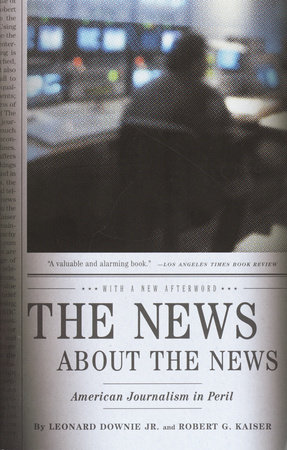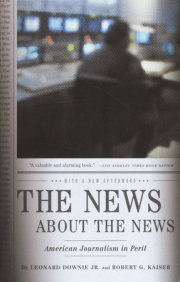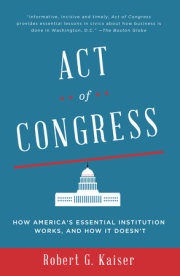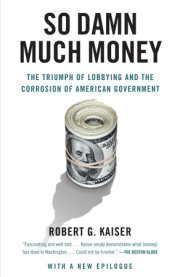Chapter One
News Matters
The story is a legend now, but it really did happen. Early in the morning of June 17, 1972, inside the headquarters of the Democratic National Committee in Washington's Watergate office building, police arrested five men wearing business suits and rubber surgical gloves and carrying cameras and sophisticated bugging devices.
The Washington Post assigned a longhaired newsroom roustabout named Carl Bernstein and one of the paper's newest reporters, Bob Woodward, to report the story. Over the next two years they unraveled a tangled conspiracy of political spying and dirty tricks, wiretaps, break-ins, secret funds and a criminal cover-up–all orchestrated by President Richard Nixon's White House.
For a long time the
Post was the only news organization to take Watergate seriously. The Washington establishment brushed the story off, and Nixon's allies put pressure on the
Post to drop it. But after months of Woodward and Bernstein's revelatory stories, government investigators and then the Congress joined the pursuit. Impeachment proceedings began, and on August 9, 1974, Nixon became the first president of the United States ever to resign his office. Watergate became an example for the ages, a classic case when journalism made a difference.
Good journalism does not often topple a president, but it frequently changes the lives of citizens, both grand and ordinary.
When Robert Hopkins telephoned
Washington Post columnist Courtland Milloy, he was sixty-five years old, a diabetic on kidney dialysis three times a week and the desperate father of three young children, ages four, five and six. Their mother had abandoned the family soon after the birth of the youngest child and shortly before Hopkins's illnesses had been discovered. When Milloy met the Hopkins family, they were squatters in an abandoned apartment complex in a run-down Washington neighborhood. The children charmed Milloy, as did Hopkins's determination to hold his family together, get his kids off to school and find them something to eat. They were surviving on $566 a month in social security benefits.
"Robert Hopkins says he hopes I can help," Milloy wrote in the
Post. "With his health deteriorating and his children's needs skyrocketing, he reluctantly places his case before the court of last resort."
After Milloy's column appeared, Hopkins received $10,000 in donations from readers. A widow with a comfortable house invited Hopkins and his children to move in with her. Other readers offered to take the Hopkins children to restaurants and amusement parks, to mentor and tutor them, to buy them clothes. In a second column, Milloy described Hopkins opening letters containing checks and offers of help: "'Who are these people?" [Hopkins] asked, tears of amazement in his eyes. 'Are they real?'"
Good journalism holds communities together in times of crisis, providing the information and the images that constitute shared experience. When disaster strikes, the news media give readers and viewers something to hold onto–facts, but also explanation and discussion that can help people deal with the unexpected. So on September 11, 2001, and for some time after, Americans remained glued to their televisions, turned in record numbers to online news sites and bought millions of extra copies of their newspapers to help absorb and cope with the horrors of a shocking terrorist attack on the United States. In the weeks that followed, good reporting allowed Americans to participate vicariously in the investigations of the terrorists and the government's planning for retaliation. Journalists could educate Americans about Islamic extremists, the history of Afghanistan, the difficulty of defending the United States against resourceful and suicidal terrorists and much more. Journalism defined the events of September 11 and their aftermath. In those circumstances the importance of journalism was obvious, and much discussed. Whether widely noticed or not, good journalism makes a difference somewhere every day.
Communities are improved by aggressive, thorough coverage of important, if everyday, subjects like education, transportation, housing, work and recreation, government services and public safety. Exposure of incompetence and corruption in government can change misbegotten policies, save taxpayers money and end the careers of misbehaving public officials. Revelations of unethical business practices can save consumers money or their health. Exploration of the growing reach of computer databases can protect privacy. Disclosure of environmental, health, food and product dangers can save lives. Examination of the ways society cares for the poor, homeless, imprisoned, abused, mentally ill and retarded can give voice to the voiceless. News matters.
In 1999 the
Chicago Tribune documented the experiences of scores of men sentenced to death in Illinois who had been beaten by police into confessing crimes, had been represented at trial by incompetent attorneys or had been convicted on questionable evidence. Soon after the newspaper published its findings, the governor of Illinois suspended all executions.
Houston television station KHOU began reporting in February 2000 that Ford Explorers equipped with certain kinds of Firestone tires had been involved in dozens of fatal highway accidents. Its reports led to nationwide news coverage, federal investigations and the recall of millions of tires, undoubtedly saving many lives.
The
Star-Ledger in Newark, investigating the 1998 shooting of four men by New Jersey state police, used the newspaper's lawyers to force the state to disclose records that showed state police had targeted black motorists by using racial profiling. The paper's stories drew national attention to the police practice of drawing up the profiles of "typical" criminals based on race and stopping random suspects based on such profiles. This reporting helped create a national political issue and led to action by both the state and federal governments to reduce the use of profiling.
Salt Lake City television station KIVX and the city's two daily newspapers, the
Salt Lake Tribune and the
Deseret News, uncovered corruption in the bidding process that had won the 2002 winter Olympic games for Salt Lake City. The city's Olympics promoters had showered gifts and financial favors on members of the International Olympic Committee and their relatives. This news mushroomed into the biggest scandal in the history of the Olympics and led to changes in bidding for future games. It also shook the pillars of the Salt Lake City community.
The
Oregonian newspaper in Portland found that many of the 140,954 holders of disabled parking permits in Oregon were not disabled at all but had obtained their permits fraudulently. By using a computer to compare the state's permit records with Social Security Administration data, the newspaper discovered that holders of 13,412 disabled parking permits were dead; able-bodied relatives were renewing and using the dead people's permits to park free at meters. State officials promised a crackdown on abusers and changes in procedures for issuing and renewing permits.
The
Miami Herald exposed pervasive voter fraud in the 1997 Miami mayoral election. Campaign workers for the mayor and other candidates registered nonresidents at phony addresses in the city, validated absentee ballots for people living outside Miami, punched other voters' absentee ballots without their permission and paid $10 each to poor and homeless people to persuade them to vote. The election result was subsequently overturned in court.
The
Philadelphia Inquirer revealed in 1998 that police had manipulated their crime records to make the city appear safer than it was in widely publicized FBI statistics. The police erased some crimes from their records entirely, and downgraded robberies, burglaries, car break-ins, stabbings and assaults to minor offenses like "threats," "lost property," "vandalism," "hospital cases" and "disturbances," which are not included in the FBI's accounting of serious crimes. The Inquirer reported later that Philadelphia police had also failed to investigate thousands of sexual-assault complaints, rejecting many of them as "unfounded" and hiding others in file drawers. Official investigations and reforms of police procedures followed.
Little Rock's
Arkansas Democrat-Gazette brought to light beatings, sexual assaults and other mistreatment of delinquent children in a state detention center and wilderness camps in 1998. A year later, the Baltimore Sun reported that guards were brutally beating teenagers in Maryland's state boot camps for delinquents. Investigations, resignations and camp closings followed in both states.
Good journalism–in a newspaper or magazine, on television, radio or the Internet–enriches Americans by giving them both useful information for their daily lives and a sense of participation in the wider world. Good journalism makes possible the cooperation among citizens that is critical to a civilized society. Citizens cannot function together as a community unless they share a common body of information about their surroundings, their neighbors, their governing bodies, their sports teams, even their weather. Those are all the stuff of the news. The best journalism digs into it, makes sense of it and makes it accessible to everyone.
Bad journalism–failing to report important news, or reporting news shallowly, inaccurately or unfairly–can leave people dangerously uninformed. The news media failed to report adequately on the overextended and corrupt savings and loan industry before it collapsed and cost depositors and taxpayers billions of dollars during the 1980s. The press failed to discover and expose the tobacco industry's cover-up of evidence of the addictive and cancer-causing effects of smoking and its clandestine marketing of cigarettes to young people until plaintiffs' lawyers discovered both in the course of liability lawsuits during the 1990s. At a time when nearly half of eligible Americans don't vote, the news media have steadily reduced their coverage of government and elections, leaving citizens vulnerable to negative and misleading political advertising that fills the airwaves instead, enriching television and radio stations during election campaigns. Although Americans are more globally connected than ever, most news media steadily and substantially reduced their coverage of foreign news during the last years of the twentieth century, depriving Americans of the opportunity to follow the world around them. This fact was widely discussed after the terrorist attack of September 2001, when foreign stories suddenly became fashionable again.
Bad journalism can misinform. Television newscasts and many newspapers routinely overemphasize crime news, so Americans continue to fear that crime is getting worse when it has actually been decreasing steadily for years. Journalists eager to attribute the deadly bombing of the Oklahoma City federal building in 1995 or the catastrophic explosion of TWA Flight 800 over Long Island to Islamic terrorists misled Americans before they knew that the real culprits were Timothy McVeigh and an exploding fuel tank on the Boeing 747. Glowing, uncritical coverage of new technology companies in the late 1990s encouraged many Americans to sink their savings into speculative stocks and mutual funds that soon crashed, collectively costing them billions of dollars.
Much bad journalism is just lazy and superficial. Local television stations lard their newscasts with dramatic video fragments of relatively inconsequential but sensational fires and auto accidents. Broadcast and cable networks devote news time to mindless chat and debate. Newspapers fill columns with fluffy trivia and rewrites of press releases and the police blotter.
Bad news judgment is commonplace. "If it bleeds, it leads" is a self-mocking slogan among local television journalists, but also an accurate description of the reflex of television news directors to make gory crime stories the first news items on the 11 o'clock news. The celebrity divorce, the police raid on a massage parlor, the opening of a county fair–all too often, it doesn't have to be new, or factual, or interesting, or important to be labeled "news."
Journalists have a special role in preserving one of America's greatest assets, our culture of accountability. Americans expect their leaders to behave responsibly, and usually take remedial action when they don't. This is an important reason why American society works better than many others. Accountability is a crucial aspect of our national ideology, which was based on the rejection of tyranny, defined by the founders as the unjust use of power. Americans in positions of power generally assume that someday they may have to account for how they have used their power. This is especially true for those who hold power in our government "of the people, by the people, for the people," but for others as well. Corporate officers hold power over companies and their customers. Foundation officers hold power over the distribution of vast sums of money. Those with power in film studios, television networks, book publishers and recording companies shape our popular culture. American society is diverse and decentralized; countless citizens exercise some power over the lives of other citizens.
Accountability is an important check on that power. Our politicians know that informed voters can throw them out of office; corporate CEOs recognize the authority of their boards of directors and the influence of their stockholders; a cop taking bribes knows he doesn't want to get caught. Good journalism is a principal source of the information necessary to make such accountability meaningful. Anyone tempted to abuse power looks over his or her shoulder to see if someone else is watching. Ideally, there should be a reporter in the rearview mirror.
Solemn obligations are far from the only justification for good journalism. The journalist's ability to connect readers or viewers to the comedy and tragedy that surrounds us all makes life richer and more rewarding. One of the rewards of being alive is watching the world change. During our nearly four decades in journalism we've seen amazing changes that have redefined the American experience: the creation of a middle-class majority in the United States; economic and cultural globalization; the celebrification of just about everything; the power of America's youth culture to infect the country and the world; the emergence of women, African Americans and gay people; and great migrations from Latin America and Asia; the long and frustrating struggle with terrorism. Journalism described all of this, though not always as quickly or thoroughly as it could have. Any attentive American could keep up with this changing world by following the news. Good journalism gives every one of us the opportunity to be real citizens of our own time.
Human beings are instinctively curious, and journalism relieves curiosity. The real workings of big-time sports, the backstage gossip from the worlds of movies and television, the personalities and company histories behind the names listed on the New York Stock Exchange, new cures and old remedies for every kind of ailment, the condition of our environment, details of community and neighborhood life–virtually the entire range of human curiosities is covered by good journalism. So it should matter to Americans that the news is at risk today. In an information age, when good journalism should be flourishing everywhere, it isn't.
Copyright © 2002 by Leonard Downie Jr. and Robert G. Kaiser. All rights reserved. No part of this excerpt may be reproduced or reprinted without permission in writing from the publisher.










